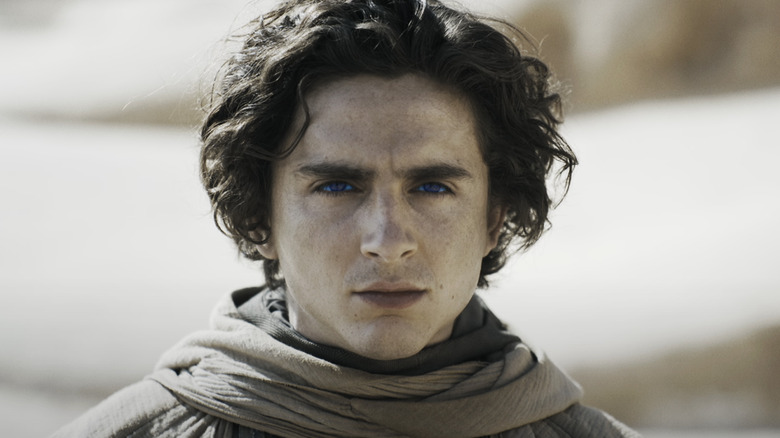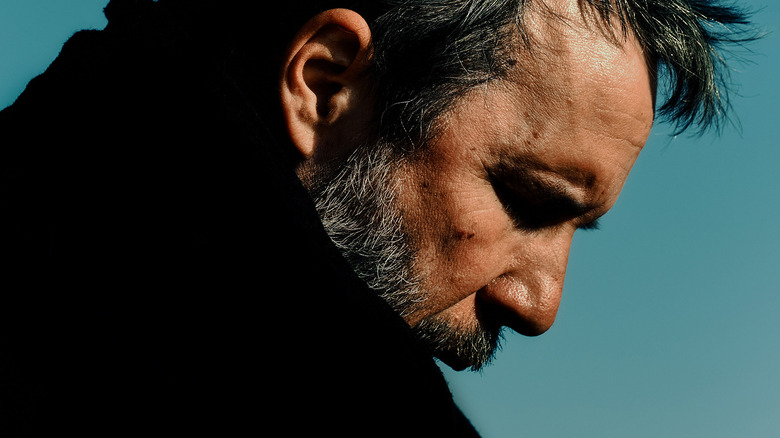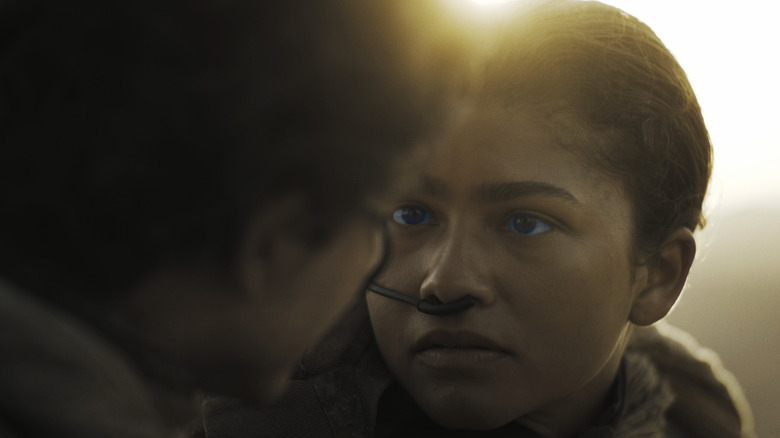Why Dune Director Denis Villeneuve 'Hates' Dialogue In Movies
Denis Villeneuve movies offer some of the most compelling visuals you'll see in modern filmmaking. "Blade Runner 2049," for instance, somehow managed to evoke the immersive atmosphere and tone of Ridley Scott's original movie while making everything feel larger and even more hauntingly dystopian. Of course, it helps when you work with cinematographers of Roger Deakins' caliber, or production designers such as Patrice Vermette, who won an Oscar for his work on Villeneuve's "Dune." But there's no doubt that, even without his esteemed cohorts, Villeneuve has a unique talent for crafting memorable and evocative visuals.
In fact, the visuals are much more important to Villeneuve than pretty much anything else. Prior to "Dune" the director hadn't written one of his own films since breaking into Hollywood with 2013's "Prisoners." Even "Dune" and its sequel "Dune: Part Two" were co-written with Jon Spaihts and Eric Roth. All of which is to say that just because Villeneueve is a hardcore fan of the "Dune" books, that doesn't mean he's necessarily a fan of dialogue. As he told Coming Soon in 2015, "I'm not someone that loves dialogue — I am someone that loves movement. Action, if it's well done, can be very poetic and meaningful."
But even when he isn't shooting action, Villeneuve has a knack for conveying information visually. Just look at that famous shot from "Blade Runner 2049," in which Ryan Gosling's K stares up at a giant digital projection of his former holographic girlfriend, Joi, and struggles to reconcile his deeply personal feelings with this giant commercialized representation of his lost love. So, what is it about this kind of visual storytelling that appeals to Villeneuve in a way that dialogue doesn't?
Denis Villeneuve thinks dialogue isn't for movies
With the bleak blockbuster that is "Dune: Part Two" set to arrive in theaters March 1, 2024, Denis Villeneuve will wrap up his epic retelling of Frank Herbert's "Dune" novel. Rather than take the David Lynch route and pack Herbert's famously dense story into one film, however, Villeneuve spread his adaptation across two films which together run an impressive 322 minutes. Even after splitting the narrative in this way, when the first film, "Dune," arrived in 2021, it came teeming with scenes full of dense dialogue, featuring various characters whisper-shouting intensely at each other. All of which you'd think would point to Villeneuve's fondness for the spoken word.
But as we know, the director isn't all that big a fan of dialogue. So what gives? Well, Villeneuve recently spoke to The Times, where he once again reiterated his preference for visual storytelling. He said:
"Frankly, I hate dialogue. Dialogue is for theater and television. I don't remember movies because of a good line, I remember movies because of a strong image. I'm not interested in dialogue at all. Pure image and sound, that is the power of cinema."
It's an odd thing for a good buddy of Christopher Nolan, whom Villeneuve thinks of as a "master," to say. Nolan loves to pack his films with line after line of complex dialogue — though he's gotten complaints from his fellow filmmakers about that dialogue being inaudible. Villeneuve, meanwhile, is just much more interested in what he can do without relying on spoken lines. In fact, he's got ambitious plans in that regard.
Could we see a dialogue-less Dune threequel?
In his interview with The Times, Denis Villeneuve claimed that "movies have been corrupted by television." When asked whether he was referring to the recent so-called "golden age of TV" and how it has affected moviemaking, the director replied:
"Exactly. In a perfect world I'd make a compelling movie that doesn't feel like an experiment but does not have a single word in it either. People would leave the cinema and say, 'Wait, there was no dialogue?' But they won't feel the lack."
Does this mean we'll be getting a completely dialogue-free Villeneuve project in the future? It seems that's not entirely out of the question. When pressed on if he'd be open to making an adaptation of Frank Herbert's "Dune" follow-up "Dune Messiah" that didn't feature any dialogue he said, "I would absolutely adore that."
Whether this will happen is, of course, another question entirely. But "Dune" did pretty well when it debuted during the global pandemic, and recently gained another box office boost ahead of the release of "Part Two." So, if the sequel does much better, Villeneuve will likely be allowed to do pretty much what he wants going forward. With that in mind, it'll be very interesting to see what he does after "Dune: Part Two."


